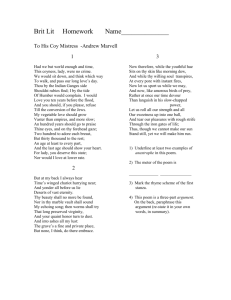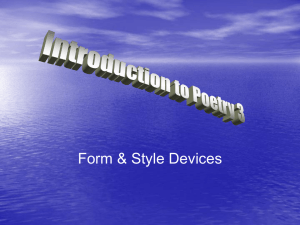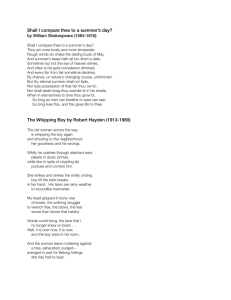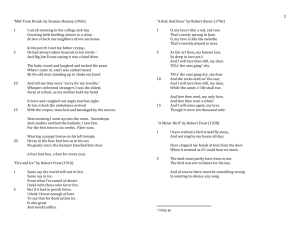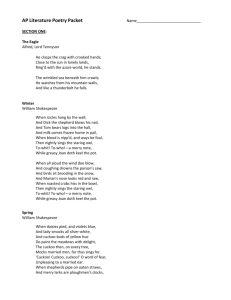Ars Poetica - Lakeside School
advertisement
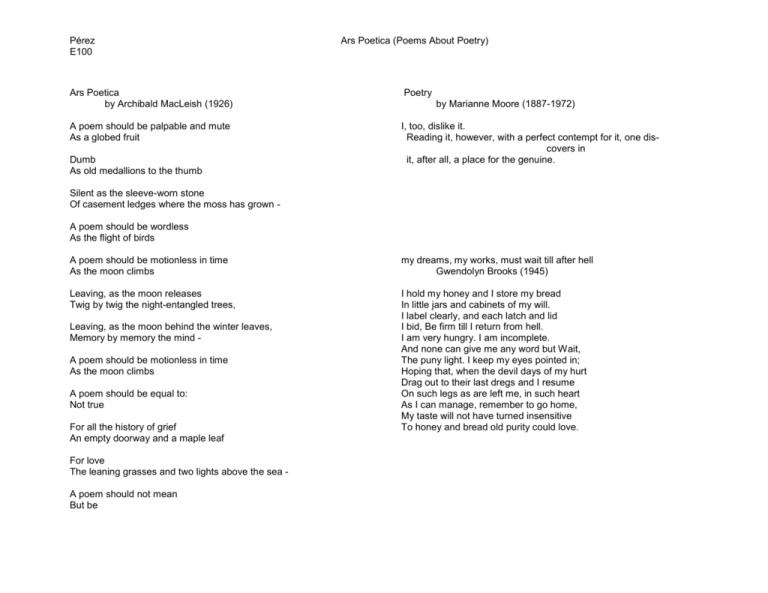
Pérez E100 Ars Poetica (Poems About Poetry) Ars Poetica by Archibald MacLeish (1926) Poetry A poem should be palpable and mute As a globed fruit I, too, dislike it. Reading it, however, with a perfect contempt for it, one discovers in it, after all, a place for the genuine. Dumb As old medallions to the thumb by Marianne Moore (1887-1972) Silent as the sleeve-worn stone Of casement ledges where the moss has grown A poem should be wordless As the flight of birds A poem should be motionless in time As the moon climbs my dreams, my works, must wait till after hell Gwendolyn Brooks (1945) Leaving, as the moon releases Twig by twig the night-entangled trees, I hold my honey and I store my bread In little jars and cabinets of my will. I label clearly, and each latch and lid I bid, Be firm till I return from hell. I am very hungry. I am incomplete. And none can give me any word but Wait, The puny light. I keep my eyes pointed in; Hoping that, when the devil days of my hurt Drag out to their last dregs and I resume On such legs as are left me, in such heart As I can manage, remember to go home, My taste will not have turned insensitive To honey and bread old purity could love. Leaving, as the moon behind the winter leaves, Memory by memory the mind A poem should be motionless in time As the moon climbs A poem should be equal to: Not true For all the history of grief An empty doorway and a maple leaf For love The leaning grasses and two lights above the sea A poem should not mean But be Pérez E100 Ars Poetica (Poems About Poetry) The Author to Her Book Anne Bradstreet (1612-1672) Thou ill-formed offspring of my feeble brain, Who after birth did'st by my side remain, Till snatcht from thence by friends, less wise than true, Who thee abroad exposed to public view, Made thee in rags, halting to th' press to trudge, Where errors were not lessened (all may judge). At thy return my blushing was not small, My rambling brat (in print) should mother call. I cast thee by as one unfit for light, The visage was so irksome in my sight, Yet being mine own, at length affection would Thy blemishes amend, if so I could. I washed thy face, but more defects I saw, And rubbing off a spot, still made a flaw. I stretcht thy joints to make thee even feet, Yet still thou run'st more hobbling than is meet. In better dress to trim thee was my mind, But nought save home-spun cloth, i' th' house I find. In this array, 'mongst vulgars may'st thou roam. In critic's hands, beware thou dost not come, And take thy way where yet thou art not known. If for thy father askt, say, thou hadst none; And for thy mother, she alas is poor, Which caused her thus to send thee out of door. Introduction to Poetry Billy Collins (1996) I ask them to take a poem and hold it up to the light like a color slide or press an ear against its hive. I say drop a mouse into a poem and watch him probe his way out, or walk inside the poem's room and feel the walls for a light switch. I want them to waterski across the surface of a poem waving at the author's name on the shore. But all they want to do is tie the poem to a chair with rope and torture a confession out of it. They begin beating it with a hose to find out what it really means.

